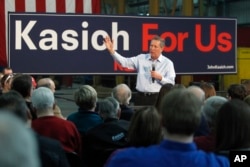The three remaining Republican presidential candidates agreed Tuesday on the need to defeat the Islamic State group, but they backtracked on their support for each other.
"We have to wipe ISIS off the face of the earth so fast and so violently, we have no choice," frontrunner Donald Trump said during a CNN town hall event in the northern state of Wisconsin, which holds its primary next week.
Texas Senator Ted Cruz, who has earned the second most delegates so far, said the U.S. should first use "overwhelming air power," then arm Kurdish fighters "and let them kill ISIS." A decision on whether to use special forces or ground troops should follow, Cruz said. He added criticism of President Barack Obama, saying he would not send American troops overseas under rules of engagement that are so strict they cannot win.
Obama's administration has clashed with the governments of both Iraq and Afghanistan over the terms governing the operations of U.S. troops on their soil.
Ohio Governor John Kasich advocated a coalition approach to destroying Islamic State that includes bigger contributions from Gulf states. He said the campaign should be both in the air and on the ground, and then troops should come home.
Kasich also criticized Cruz's proposal for police to patrol Muslim neighborhoods in order to root out terrorism.
"We can't afford polarization of people who are in the civilized world," Kasich said. "There are people all over the world that know this threat has to be stopped, it has to be destroyed, and we have to work together as a world because when people in Pakistan die, we all die a little bit when they blow up innocent men, women and children at an Easter service."
Trump said the United States is paying too much to support NATO, which he called "obsolete," and that other countries in the alliance are getting an unfair "free ride."
Kasich later agreed that other countries need to pitch in and do more, but said that calling NATO obsolete is "absurd." He advocated reforming the alliance to include intelligence gathering and policing across boundaries.
Early in the race, when the Republican field was much larger, all of the candidates pledged to support whichever of them eventually became the party's nominee in the November general election.
As the campaign has become more divisive and combative, those good feelings toward each other have eroded, and on Tuesday they stepped back from their absolute pledges.
Trump said he is no longer committed to the pledge and added that he has been "treated very unfairly" by the party.
Cruz did not directly answer whether he would stand by the nominee, but said Trump winning would be a "train wreck" and that his solution to the question is for himself to win the nomination.
Kasich said he will have to see how the campaign finishes before determining whether he will offer his support.
"If the nominee is somebody that I think is really hurting the country and dividing the country, I can't stand behind them," he said. "But we have a ways to go, let's see how this all folds out and then I'll let you know."






